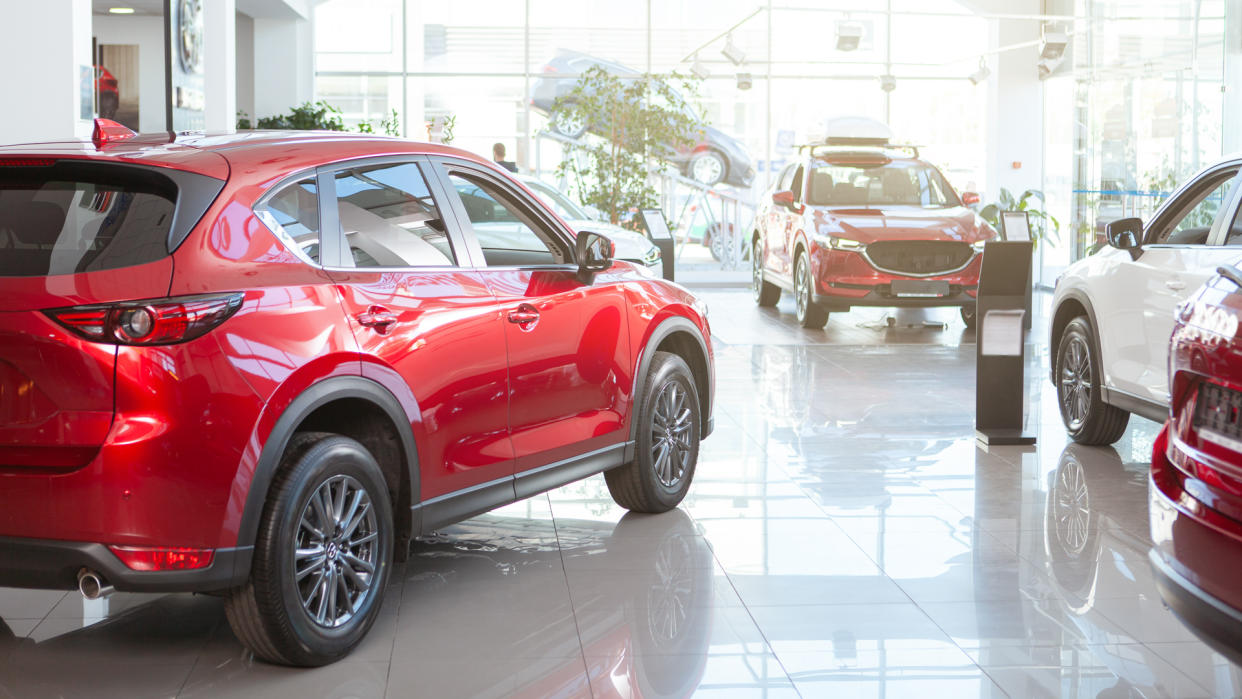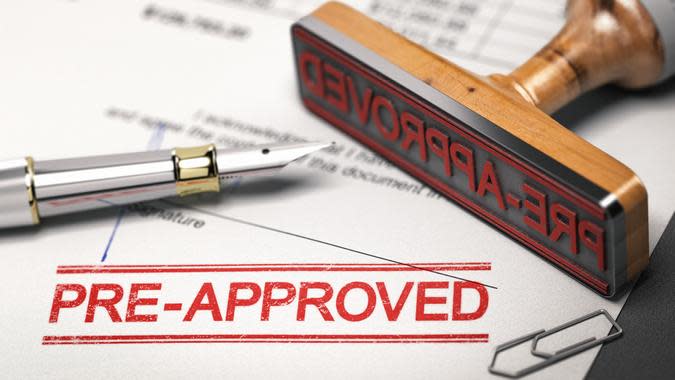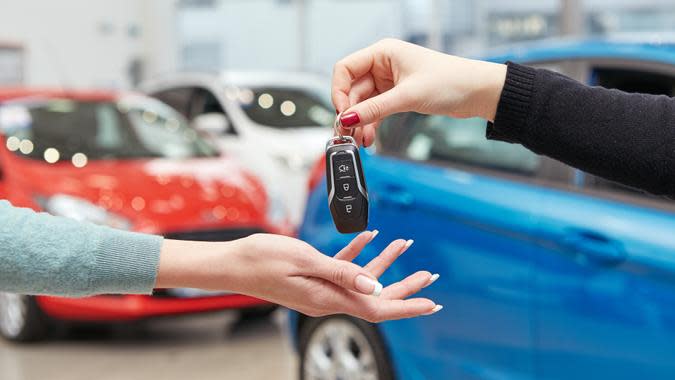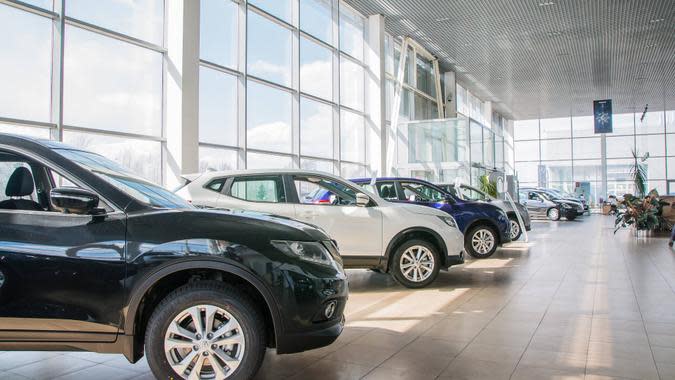10 Ways To Afford a Car in an Inflated Economy

A recent GOBankingRates poll found that 25% of Americans are postponing purchasing a car due to the current economic climate. With car prices reaching record highs, it's no wonder that buying a car is no longer affordable for many Americans. A recent Kelley Blue Book analysis found that the average price of a new car is now $48,182 -- a 12% increase from the previous year.
Explore: Your Biggest Money Etiquette Questions Answered
Here It Is: Our 2022 Small Business Spotlight
"With tight inventory and sufficient demand, transaction prices remain elevated," the Kelley Blue Book analysis stated. "Most dealers continue to sell vehicles above the manufacturer's suggested retail price."
While it's true that buying a car is more expensive than ever before, there are still ways to make car buying more affordable. Here are a few expert tips to save on your next vehicle purchase.

Opt for an 'Almost New' Vehicle
You may be able to shave some money off the sticker price by opting for a vehicle that isn't brand new.
"Try searching for test cars or 'almost new' cars -- cars with just a few thousand miles," said Petar Dzaja, owner of CarDetailingPlanet.com.
Take Our Poll: Do You Tip for Service?

Get Pre-Approved for a Car Loan
Because a car is such a large purchase, securing the lowest interest rate possible can provide you with big savings in the long term.
"Pursuing pre-approval gives you a chance to shop around for the best interest rate as opposed to having to go with dealership financing, which can include sky-high interest rates," said Jim Trevors, an automotive expert and head of operations at We Review Tires. "That being said, you should still inquire about dealership financing on the off chance it's better than your pre-approved loan."

Maximize Your Trade-In
If you have a car to sell, you should make sure you're getting top dollar for it to help you offset the cost of your new car purchase.
"If your old car was worth a large sum of cash before inflation, odds are it will be worth even more now, as cars are a hot commodity," Trevors said. "Check your car's value on Carvana or Kelley Blue Book to ensure you're getting as much out of your old vehicle as possible."

Comparison Shop
It will take some extra time to visit dealerships to compare prices, but in this inflationary economy, it's worth it.
"Comparing prices between dealerships will help you get the best deal on the car you want," said Joe Giranda, director of sales and marketing at CFR Classic, which specializes in international car shipping and relocation.

Ask About Rebates and Incentives
Your purchase may qualify you for money-saving rebates and incentives, but you may have to ask the dealer to find out about them.
"Many manufacturers offer rebates or other incentives when you purchase a new car. Be sure to ask about any current offers that may be available," said Oberon Copeland, founder and CEO of Very Informed, which aims to help readers become informed about products, services and more.

Ask About Rate Subsidy Programs
"When interest rates rise, we typically see the industry and manufacturers respond with rate subsidy programs," said Scott Kunes, chief operating officer at Kunes Auto Group, which owns over 40 auto dealerships across the Midwest. "While these are often a great deal, the customer should ensure they are working with a knowledgeable dealer that can recommend the best option within their budget. Often, taking rebates and an unsubsidized rate will be beneficial in the long run; other times, a lease may present itself as the best option."

Opt for Less In-Demand Car Models
The type of vehicle you purchase can have a major influence on how good of a deal you can get.
"Buyers should start the search for vehicles without MSRP markups," said Matas Buzelis, an auto expert at carVertical. "Ignore SUVs and pickup trucks because their demand is at an all-time high, and there's little chance of finding a dealership or private seller who doesn't want to take advantage of the situation in the market.
"Furthermore, buyers should broaden their horizons when choosing body types," he continued. "Less popular body types or vehicles with lesser equipment levels will likely be a lot cheaper, and it could be a key to finding the good deal buyers are searching for."

Know Your State's Maximum Documentation Fee
A "documentation fee" is often charged by the dealer to cover the paperwork and processing of the title, registration and tags.
"This fee can't be waived entirely, but research your state's most recent regulations," said Richard Reina, product training director at CARiD.com. "Many states place a legal limit on the maximum amount a dealer can charge in fees. It's best to know what this maximum is and advocate for yourself if you feel you are getting hit with unnecessary fees."

Avoid Upsells and Add-Ons
"One major area where many people end up spending more money when purchasing their new vehicle is by upsells and add-ons," Reina said. "Beware of add-ons you didn't request, such as 'window etching' -- the VIN is etched into each window glass, wheel locks and paint treatments. Just because these are on the vehicle already doesn't mean you're required to pay for them. Because vehicle supply is so limited these days, you may not have a choice of another vehicle without them, but be willing to negotiate hard if you are asked to pay for add-ons you didn't request."

Don't Be Afraid to Negotiate
Whether or not the car you are looking to buy has unrequested add-ons, you should still make an effort to negotiate the price.
"The car market is still a seller's market because of the shortages of used cars that have created scarcity and raised prices, but that doesn't mean you can't make an offer that's a little lower than what the seller is asking," said Grant Feek, CEO of TRED, a platform for buying and selling used cars.
More From GOBankingRates
This article originally appeared on GOBankingRates.com: 10 Ways To Afford a Car in an Inflated Economy
